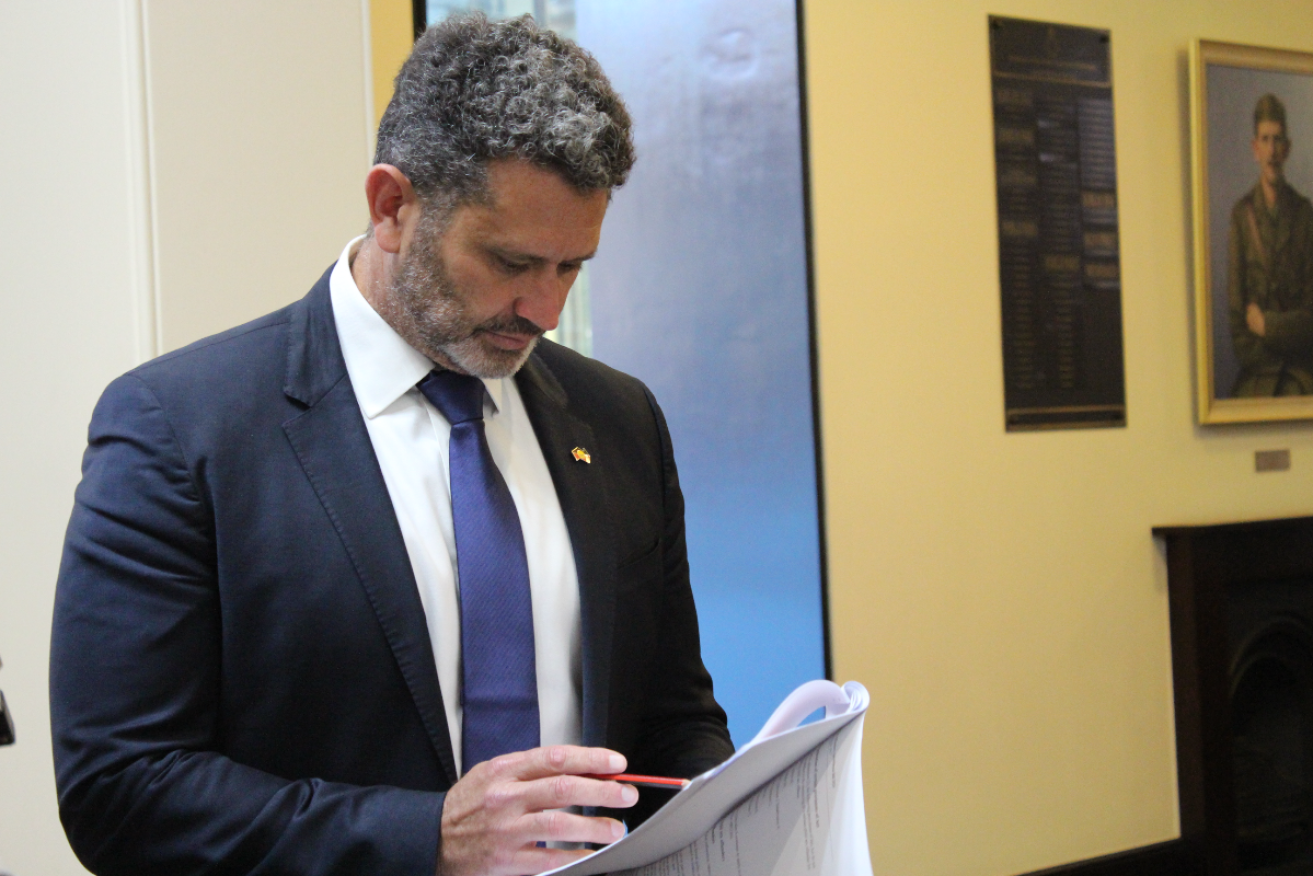Legal concerns raised over repeat child sex offender law push
Repeat child sex offenders could be jailed indefinitely under an amendment to sentencing legislation introduced to state parliament, with the Law Society of SA raising serious concerns about the move.


Attorney-General Kyam Maher dismissed concerns from the South Australian legal profession about his Bill. Photo: Isabella Kelly / InDaily
Attorney-General Kyam Maher said the amendment would ensure “vile monsters” that are jailed for a second time for a serious child sex offence remain in prison for life.
Maher introduced the amendment to the Legislative Council yesterday, following a rebuke from the legal profession after the Bill was announced in January.
If passed, the Bill will also state that repeat child sex offenders will only be eligible for release if they can satisfy the court that they are willing and able to control their sexual instincts. Once released, they will be monitored electronically for life.
In January, the national criminal justice spokesperson for the Australian Lawyers Alliance (ALA), Greg Barns SC, said the laws were developed without consultation with the legal community and would result in injustice.
“These new laws will result in injustice and are a dangerous breach of the separation of powers by interfering with judicial discretion,” said Barns, a former national president of the ALA and an advocate for Australia adopting a Bill of Rights.
At a press conference yesterday, Maher said that after the government announced its intention to introduce the amendments it had “done a round of consultation”.
“Between the announcement in January and now we’ve consulted with a whole range of groups including the Law Society of South Australia and the Bar Association,” he said.
“We’ve had people raise their concerns about this, but we will make absolutely no apologies when it comes to being on someone’s side. We’re on the side of children, not on the side of vile monsters.”
In a letter sent to Maher by the Law Society of South Australia President Alex Lazarevich on March 7, seen by InDaily, the Society said the “proposed sentencing arrangements risk creating a criminal law system that evaporates any incentive to plead guilty, creates a significant impost on the State, exacerbates congestion in the courts, causes injustice and risks constitutional challenge”.
“The Society’s position is that mandatory sentencing is to be avoided,” he said.
Lazarevich raised several points of contention with the law change, including that “the broad circumstances which may enliven these offences can include inadvertent behaviours, such that they may (depending on the facts) be regarded to be lower-level sexual offences”.
“For example, there may be a greater moral turpitude involved with unlawful sexual intercourse offences where there is a large age disparity or predatory behaviour than compared to a not uncommon boyfriend/girlfriend/close relationship between people of close ages,” he said.
“Another example might be the sharing of photos between young people in a relationship which will have a different degree of seriousness than child exploitation material for purposes of gratification, particularly where that involves young people.”
Further, by threatening those who are repeated child sex offenders with a life imprisonment sentence, Lazarevich said the proposed arrangements “may evaporate entirely any remaining incentive for a serious child sex offender to plead guilty”.
“Under the current scheme there is already little incentive to enter a plea of guilty as a result of reductions made to maximum discounts and mandatory non-parole periods for repeat offenders,” he said.
“There must be at least some tangible benefit to the accused person guiding their decision to accept the adverse consequences of admitting a serious criminal offence.”
The Law Society also was concerned about how the government could accommodate repeat child sex offenders in prison for life: “This will inevitably cost substantially more at the expense of the taxpayer and require a significant increase to the facilities to house such additional prisoners,” Lazarevich said.
He also noted that the arrangements “appear to place limited faith in the judicial system to perform its constitutional role by mandating an outcome and largely removing its sentencing discretion”.
“The proposed amendments tend to render the court hamstrung on sentence in the relevant circumstances, directing it to ignore longstanding and important matters forever regarded as relevant to sentence,” he said.
“The Society has recently raised concern regarding possible intrusions on the exclusive domain of the courts to impose sentences on people via the application of the law and the compatibility of such proposals with the separation of powers.
“The Society repeats that the High Court of Australia has in recent times struck down laws that have intruded into the exclusive purview of the courts.”
Maher was asked whether he was concerned that the legislation could lead to the law being challenged in the High Court, and said: “I fundamentally disagree with that view”.
“We have spent many, many months refining these laws to make sure they’re crafted in such a way to give them the best possible chance, should anyone decide to take action against these laws in a court challenge,” he said.
In February, forensic psychologist Luke Broomhall told InDaily that there was an issue with “broad sweeping laws which cover all persons, when there might be more effective ways to manage the behaviours of people who are at high risk for recidivism”.
The psychologist’s position was put to Maher, who said: “There may be other ways, but I can tell you, one sure way to stop someone who offends against children…is putting them in jail for the rest of their lives”.
“South Australia had the lowest rate of recidivism – that is those offending and returned to prison again. So we do have programs and they are working in South Australia.”




